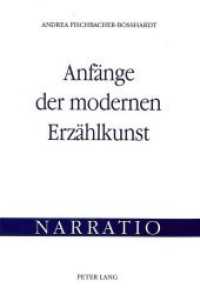- ホーム
- > 洋書
- > 英文書
- > History / World
Full Description
The new edition of The Peoples of the British Isles presents the history of the peoples of England, Ireland, Scotland, and Wales from prehistoric times to the present. Through the frameworks of cultural, intellectual, and social history, the authors examine the conflicts and commonalities among the people of these four nations. The book focuses throughout on the lives of real people-how they made a living, how they organized their society and institutions, how they related to each other, and how they understood themselves and their world. This new, combined volume covers the period following the Revolution of 1688 and the coronation of William of Orange through present day Britain. Heyck and Veldman deftly explore the British Isles' changing place in the world, and the implications of those changes for its people.Major themes covered in this volume include* the formation of the British nation-state and the evolution of British national identity* the emergence, expansion, and decline of the British Empire in the context of a changing global economic order* Britain's rise as the world's foremost industrial power and its subsequent economic decline and adaption* the interplay of international warfare and domestic political change* the implications of Britain's changing roles in the world for social identities and gender rolesFeatures of the new edition:* new format combines what was once volume II and III into one single volume* Full and fair treatment of the Celtic countries of the British Isles and their interactions and conflicts with England* Expanded discussion on Thatcher's Britain and new discussions on Post-Thatcher Britain including sections on Blair's Britain, the economic collapse of 2008, and the challenge of Islamism* Fully incorporated, expanded coverage of popular culture including new sections on the intersection of commercialism and culture; discussions of the work of Jane Austen, Elizabeth Gaskell, and George Eliot; and discussions of pop art, rock and roll, and television soap operas* Fully incorporated, expanded coverage of women's issues including a discussion of the role of women in the revolts against Highland Clearances; differences in legal status between women of the four nations; an updated look at changes in women's roles during and after the wars; the impact of the "permissible society" and consumerism on gender roles* expanded map program and suggested readings throughout
Contents
* Part I'The Age of the Landed Oligarchy, 1688-1763*1 The Lands and Peoples of the British lsles at the End of the Seventeenth Century* England* Wales* Scotland* Ireland* Suggested Reading*2 The Revolution of 1688 and the Revolution Settlement* The Reign of Charles II, 1660-1685* Whigs and Tories Rebel, 1685-1688* William III and the Revolution in England* The Revolution in Ireland, 1688-1691* Scotland: From Revolution to Union* Foreign Wars* The Financial Revolution* The Hanoverian Succession, 1714* Suggested Reading*3 Society and Economy in Eighteenth-Century England* The Social Structure: An Open Hierarchy* Social Relations: Property, Patronage, and Deference* Land, Marriage, Patriarchy, and the Family* The Commercial Revolution* Manufacturing before the Industrial Revolution* The Changing Agricultural Order* Suggested Reading*4 Political Structure and Politics in Augustan England* Achieving Political Stability, 1700-1720* Local Government and the Law in the Age of Oligarchy* The Structure of National Politics, 1715-1760* Walpole and the Robinocracy* The Great Commoner: William Pitt the Elder* Popular Politics* The Growth of the British State* Suggested Reading*5 Religion, Rationality, and Recreation: Culture in Eighteenth-Century England* The Enlightenment in England* The Empiricist Tradition* Nature, God, and Morality* Religion and the Church in England* Commercialization and Culture: The Written Word* Commercialization and Culture: The Visual Arts* Popular Culture, Common Cultures* Suggested Reading*6 Scotland in the Eighteenth Century* The Jacobite Rebellion of 1715* The '45* The Destruction of the Clans and the Transformation of the Highlands* Developments in Lowland Scotland* The Scottish Enlightenment* Suggested Reading*7 The Expansion of British Power and Empire, 1715-1763* The European State System* British Interests and Power* The Colonies* The War of Jenkins' Ear-King George's War (1739-1748)* The French and Indian War--The Seven Years' War (1756-1763)* The Prizes of Victory* Suggested Reading* Part II The Age of Revolutions, 1763-1815*8 The Crisis of Empire, 1763-1783* George III and the Politicians* John Wilkes and Popular Politics* Britons into Americans* Tightening the Empire* The War for Colonial Independence* The Aftermath* Suggested Reading*9 The Rise of the Protestant Nation in Ireland* The Protestant Landlords and Their Culture* Economy, Land, and Potatoes* Rise of the Protestant Nation* Grattan's Parliament* Suggested Reading*10 The Triple Revolution, 1760-1815* The Agricultural Revolution* The Population Explosion* The Industrial Revolution* Key Industries: Iron, Coal, and Cotton* Geographical Specialization* Causes of Industrialization* Social Preconditions* Cultural Preconditions* Social Consequences of the Triple Revolution* Suggested Reading*11 The War Against the French Revolution, 1789-1815* William Pitt the Younger and National Revival* Origins of the War with France* War with France, 1793-1798* The War at Home* The Crisis of 1797-1798* War, 1798-1815* The Prizes and Costs of War, 1793-1815* Suggested Reading*12 Intellectual and Spiritual Revolutions, 1780-1815* Utilitarianism* Parson Malthus* John Wesley and the Evangelical Revival* The Theology and Appeal of Evangelicalism* Methodism in Wales* The Evangelicals in the Church of England* The Antislavery Movement* Romanticism* The English Romantic Poets* Romanticism in Wales and Scotland* British Romantic Architecture and Painting* Suggested Reading* Part III The Rise of Victorian Society, 1815-1870*13 The Emerging Class Society, 1815-1850* British and Irish Populations, 1815-1850* The British Economy, 1815-1850* The Landed Class: Aristocracy and Gentry* The Middle Class* The Emerging Working Class* Suggested Reading*14 Politics and the State, 1815-1850* The Structure of Politics and the Scope of the State in 1815* Political Reform, 1815-1835* The Structure of Politics After 1832* The Condition of England Question and the Growth of the State, 1832-1850* Class Politics: The Anti-Corn Law League and the Chartist Movement* Suggested Reading*15 Ireland from the Union to the Famine* The Irish Question* Daniel O'Connell and Catholic Emancipation* Repeal and Young Ireland* The Great Famine, 1845-1850* Young Ireland and 1848* Suggested Reading*16 Mid-Victorian Society and Culture, 1850-1870* Economic Stability* Muting of Social Conflict* The Crystal Palace, 1851* High Culture of the Victorian Period* Exemplars: Carlyle, Dickens, Tennyson, and Mill* Women Writers in the Victorian Period* Victorian Painting and Architecture* The Rise of Science* Religion, Science, and the Crisis of Faith* Suggested Reading*17 The Overflow of Power: British Empire and Foreign Policy, 1815-1870* British Power and Interests* The Free Trade Empire* The Jewel in the Crown: India* An Imperial Culture?* Foreign Policy under Castlereagh and Canning* Foreign Policy under Palmerston* The Crimean War* Suggested Reading* Part IV The Decline of Victorian Britain, 1870-1914*18 Upheaval in Economy and Society, 1870-1914* Upheaval in Economy and Society, 1870-1914* Agricultural Depression in England and Wales* Land Wars in Ireland and the Scottish Highlands* Relative Industrial Decline* The Edwardian False Dawn* Social Change: The Class System* Social Change: Gender Roles and Relations* The Women's Movement* Suggested Reading*19 Crisis of Confidence, 1870-1914* Scientific Naturalism* New Liberalism* Socialism* Aestheticism* Suggested Reading*20 Revival on the Celtic Fringe* Wales: Coal, Nonconformity, and Linguistic Nationalism* Scotland: National Identity and the Gaelic Revival* Ireland: From the Devotional Revolution to the Home Rule Movement, 1850-1890* Ireland: Literary Renaissance and Cultural Nationalism, 1890-1914* Ireland: New Expressions of Political Nationalism, 1890-1914* Suggested Reading*21 Politics and the State, 1867-1914* The Reform Act of 1867* The Impact of the 1867 Reform Act* Gladstone and Disraeli* Home Rule and British Politics* New Unionism and the Rise of Labour* The Triumph of New Liberalism, 1906-1910* The Trials of Liberalism, 1910-1914* Suggested Reading*22 The British Empire and the Coming of War, 1870-1914* The Imperialist Idea* Great Power Rivalries and Imperial Expansion* The South African War, 1899-1902* Britain and Europe: From Isolation to Alliance* The Drift into War, 1905-1914* Suggested Reading* Part V An Age of Total War, 1914-1945*23 The Great War, 1914-1918* The Course of War, 1914-1916* The Combat Experience* The Home Front* Wartime Politics* War's End, 1917-1918* Counting the Cost* Social and Cultural Consequences* Suggested Reading*24 The War and the Celtic Countries: Ireland Leaves the Union, 1914-1923* The Impact of the Great War on Scotland and Wales* Ireland and the Great War, 1914-1916* The Easter Rebellion, 1916* The Advent of Sinn Fein* The Anglo-Irish War and the Treaty of 1921* Civil War in Ireland, 1922-1923* Epilogue: Ireland, 1921-1939* Suggested Reading*25 Economy, Society, and Culture Between the Wars, 1919-1939* The British Economy between the Wars* Trade Unions, Class Conflict, and the General Strike of 1926* Society between the Wars* Popular Culture* High Culture* Suggested Reading*26 Politics, Power, and the Coming of War, 1919-1939* The Structure of Politics and Government* The Lloyd George Government, 1918-1922* MacDonald and Baldwin* British Power and Interests between the Wars* Chamberlain and the Coming of War, 1937-1939* Suggested Reading*27 Britain and World War II* Standing Alone, September 1939 to June 1941* The Turn of the Tide, June 1941 to January 1943* The War at Home* Victory, January 1943 to August 1945* Counting the Costs* Suggested Reading* Part VI Britain in the Postwar World, 1945-2014*28 Welfare, Affluence, and Consensus: Culture and Society, 1945-1970* Building the Welfare State, 1945-1951* From Austerity to Affluence, 1945-1970* Gender, Class, and Race in the Affluent Society* The Permissive Society* The Culture of Austerity and Affluence* Suggested Reading*29 Illusions of Power: International and Domestic Politics, 1945-1970* The Structure of Government and Politics* Labour and the Problems of Empire, 1945-1951* The Tory Years, 1951-1964* Suez and After* Labour's Recovery and Fall, 1964-1970* The General Election of 1970* Suggested Reading*30 The End of Consensus, 1970-1990* Entering the Postindustrial Age: Economic Troubles and Cultural Crisis in the 1970s* The Heath Government, 1970-1974* The Labour Governments, 1974-1979* Thatcher and Thatcherism* Thatcher's First Government, 1979-1983* From Thatcherism's Zenith to Thatcher's Fall, 1983-1990* Thatcher's Britain* Suggested Reading*31 Post-Thatcher Britain, 1990-2014* The Troubled Times of John Major, 1990-1997* Tony Blair and the Rise of New Labour* Blair's Britain The Collapse of 2008: Economic Crisis and Political Confusion*"Britishness" in the Twenty-first Century* British Society and Culture in the Twenty-first Century* Suggested Reading*32 The Question of Britain: The Celtic Countries, 1945-2014* Wales, 1945-1997* Scotland, 1945-1997* The Other Island* The Return of the Troubles to Northern Ireland* The Long Road toward Peace in Northern Ireland* Devolution: Peace in Northern Ireland but the End of Britain?* Suggested Reading* Appendixes* A Kings and Queens of Great Britain, 1685-2014* B Chief Cabinet Ministers, 1721-2014* Index







